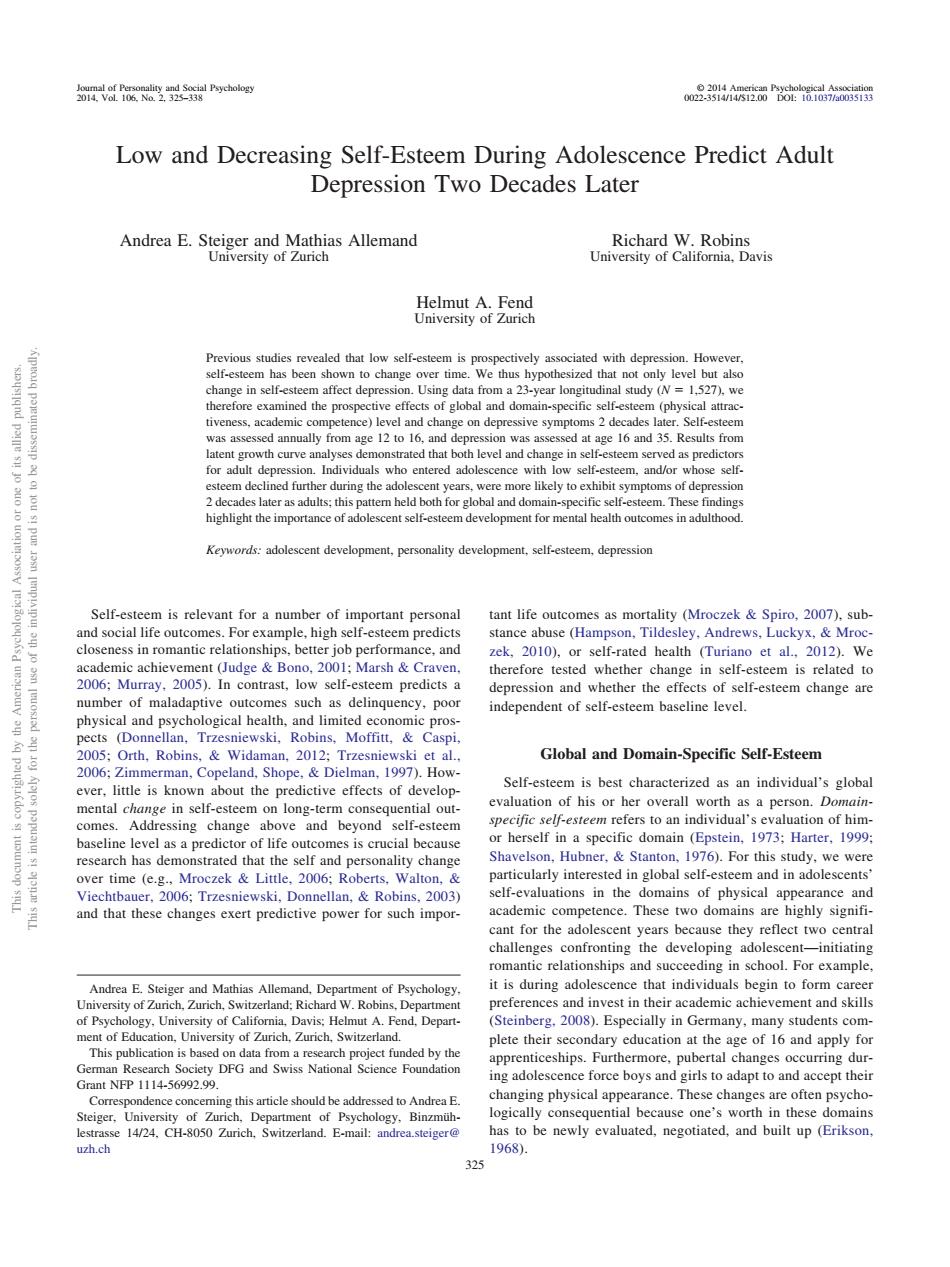正在加载图片...

Low and Decreasing Self-Esteem During Adolescence Predict Adult Depression Two Decades Later Uevnuty r encd Previous studies vealed that low self-esteem is pro ed with dep 四。忘 (ph 2 decades Self-es a cur e in se ed as predictor ng the e likely to exhibit s f dep Kevwords:adolescent development.personality development,self-esteem,depression Self- is relevant for a number of important persona tant life outco es as mortality (Mroczek&Spiro,2007).sub- 2010. 80tnite0tdeBoao20oMh&caen therefore tested whether change in self-estcem is related to n and whether the effects of self-esteem change are 2005:Orth.Robins. nan.2012:Trzes Global and Domain-Specific Self-Esteem mental in self-esteem l as cdictor of life an ial be in a spec fic domain (Epsten rch has dem particularly interested in global self-esteem and ind elf-evaluations in the and that these changes exert predictive power for such impor ant for the adol tra s confronting the developing adolescen initiating or examp referencesand their academic achievement and skills 02008 Esp ally in Germany,many s is bas apprenticeships.Furthermore.pubertal changes occurring dur ng adolescence force boys and girls to adapt to and accept thei tNFP1114-56992.9 this article should be addressed to andrea 14.CH-050 Zurich..E-mail to be newly evaluated,negotiated,and built up (Erikson. zh.ch 1968 2 Low and Decreasing Self-Esteem During Adolescence Predict Adult Depression Two Decades Later Andrea E. Steiger and Mathias Allemand University of Zurich Richard W. Robins University of California, Davis Helmut A. Fend University of Zurich Previous studies revealed that low self-esteem is prospectively associated with depression. However, self-esteem has been shown to change over time. We thus hypothesized that not only level but also change in self-esteem affect depression. Using data from a 23-year longitudinal study (N 1,527), we therefore examined the prospective effects of global and domain-specific self-esteem (physical attractiveness, academic competence) level and change on depressive symptoms 2 decades later. Self-esteem was assessed annually from age 12 to 16, and depression was assessed at age 16 and 35. Results from latent growth curve analyses demonstrated that both level and change in self-esteem served as predictors for adult depression. Individuals who entered adolescence with low self-esteem, and/or whose selfesteem declined further during the adolescent years, were more likely to exhibit symptoms of depression 2 decades later as adults; this pattern held both for global and domain-specific self-esteem. These findings highlight the importance of adolescent self-esteem development for mental health outcomes in adulthood. Keywords: adolescent development, personality development, self-esteem, depression Self-esteem is relevant for a number of important personal and social life outcomes. For example, high self-esteem predicts closeness in romantic relationships, better job performance, and academic achievement (Judge & Bono, 2001; Marsh & Craven, 2006; Murray, 2005). In contrast, low self-esteem predicts a number of maladaptive outcomes such as delinquency, poor physical and psychological health, and limited economic prospects (Donnellan, Trzesniewski, Robins, Moffitt, & Caspi, 2005; Orth, Robins, & Widaman, 2012; Trzesniewski et al., 2006; Zimmerman, Copeland, Shope, & Dielman, 1997). However, little is known about the predictive effects of developmental change in self-esteem on long-term consequential outcomes. Addressing change above and beyond self-esteem baseline level as a predictor of life outcomes is crucial because research has demonstrated that the self and personality change over time (e.g., Mroczek & Little, 2006; Roberts, Walton, & Viechtbauer, 2006; Trzesniewski, Donnellan, & Robins, 2003) and that these changes exert predictive power for such important life outcomes as mortality (Mroczek & Spiro, 2007), substance abuse (Hampson, Tildesley, Andrews, Luckyx, & Mroczek, 2010), or self-rated health (Turiano et al., 2012). We therefore tested whether change in self-esteem is related to depression and whether the effects of self-esteem change are independent of self-esteem baseline level. Global and Domain-Specific Self-Esteem Self-esteem is best characterized as an individual’s global evaluation of his or her overall worth as a person. Domainspecific self-esteem refers to an individual’s evaluation of himor herself in a specific domain (Epstein, 1973; Harter, 1999; Shavelson, Hubner, & Stanton, 1976). For this study, we were particularly interested in global self-esteem and in adolescents’ self-evaluations in the domains of physical appearance and academic competence. These two domains are highly significant for the adolescent years because they reflect two central challenges confronting the developing adolescent—initiating romantic relationships and succeeding in school. For example, it is during adolescence that individuals begin to form career preferences and invest in their academic achievement and skills (Steinberg, 2008). Especially in Germany, many students complete their secondary education at the age of 16 and apply for apprenticeships. Furthermore, pubertal changes occurring during adolescence force boys and girls to adapt to and accept their changing physical appearance. These changes are often psychologically consequential because one’s worth in these domains has to be newly evaluated, negotiated, and built up (Erikson, 1968). Andrea E. Steiger and Mathias Allemand, Department of Psychology, University of Zurich, Zurich, Switzerland; Richard W. Robins, Department of Psychology, University of California, Davis; Helmut A. Fend, Department of Education, University of Zurich, Zurich, Switzerland. This publication is based on data from a research project funded by the German Research Society DFG and Swiss National Science Foundation Grant NFP 1114-56992.99. Correspondence concerning this article should be addressed to Andrea E. Steiger, University of Zurich, Department of Psychology, Binzmühlestrasse 14/24, CH-8050 Zurich, Switzerland. E-mail: andrea.steiger@ uzh.ch This document is copyrighted by the American Psychological Association or one of its allied publishers. This article is intended solely for the personal use of the individual user and is not to be disseminated broadly. Journal of Personality and Social Psychology © 2014 American Psychological Association 2014, Vol. 106, No. 2, 325–338 0022-3514/14/$12.00 DOI: 10.1037/a0035133 325